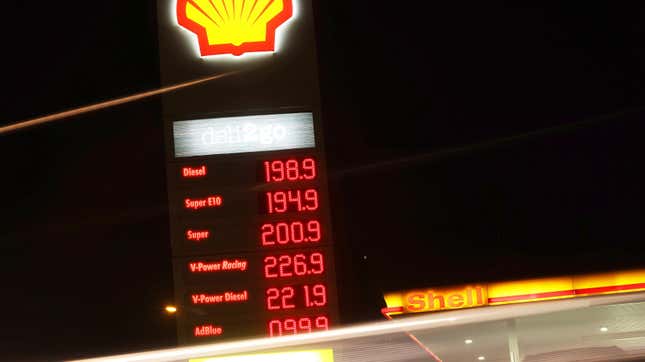
Update: 3/8/2022 8:55 a.m. ET: On Tuesday, Shell caved to the backlash from its decision, releasing a statement explaining that the company would immediately stop buying Russian oil and start removing it from the supply chain. “We are acutely aware that our decision last week to purchase a cargo of Russian crude oil to be refined into products like petrol and diesel – despite being made with security of supplies at the forefront of our thinking – was not the right one and we are sorry,” Shell CEO Ben van Beurden said in the statement.
Original article appears below.
On Friday, Shell went against most of its industry counterparts and international goodwill to scoop up a record discount on Russian oil during the ongoing invasion of Ukraine. But the company still wants you to think it’s a good guy, as it’s promised to donate profits to humanitarian aid for Ukraine.
Oil prices are going nuts around the world right now, thanks in part to the conflict: The price of a barrel at one point on Monday hit $139, the highest price in over a decade. But the industry as a whole has been avoiding Russian oil exports, a crucial revenue stream for the country, as the world explores sanctions. Several big oil majors last week, including BP, Exxon, and Shell, announced that they would pull out of in many cases longstanding and profitable ventures in the region due to Putin’s actions.
That’s all to say that the oil Shell scooped up was super duper cheap, thanks to most players being unwilling to touch it. Last week, Shell bought 100,000 tons of crude, or around 725,000 barrels, of Russian flagship crude oil for around $28.50 below the global benchmark price, the Wall Street Journal reported. It’s one of the steepest discounts for oil in history.
The Financial Times reported Friday that Shell stood to make a cool $20 million from the fire sale of this oil. Traders told the FT that they had expected a lesser-known Chinese or Indian company to spring for the controversial oil. “I am astonished that Shell lifted this cargo,” one trader told FT.
People were, understandably, unhappy that one of the largest oil and gas companies in the world would go for a tanker of Russian oil to turn a quick buck during this human rights crisis.
“I am told that Shell discretely bought some Russian oil yesterday,” Dmytro Kuleba, Ukraine’s Minister of Foreign Affairs, tweeted on Saturday. “One question to @Shell: doesn’t Russian oil smell [of] Ukrainian blood for you? I call on all conscious people around the globe to demand multinational companies to cut all business ties with Russia.”
Sensing that this might have been a bad PR move, Shell went into damage-control mode over the weekend. Late on Saturday, the company released a statement about the purchase, which it called a “difficult decision.” The statement said that Shell is “appalled by the war in Ukraine,” but that it would continue to buy Russian oil as the shift to alternatives “cannot happen overnight.” The company pledged that it would put profits from the oil into a “dedicated fund” that it would give to humanitarian aid for Ukraine. Yeah, guys, that totally makes it better.
Earther was, uh… out of commission last week, but the invasion of Ukraine has dramatically shifted the conversation around oil and gas, especially in the U.S. Fossil fuel prices—which were already high before the invasion and are shaped by a whole bunch of factors, including industry control and investor pressure—are skyrocketing in the U.S. and across Europe. The U.S. and its allies have carefully avoided imposing any sanctions on Russian oil, although Secretary of State Antony Blinken said on Sunday that they were exploring that option.
The U.S. oil and gas industry, meanwhile, has gleefully seized on this crisis to push long-standing agenda items like increasing oil and gas leasing on federal lands and waters (despite the fact that the industry is sitting on an overwhelming amount of unused leases). Last week, Mike Sommers, CEO of the American Petroleum Institute, the industry’s most powerful lobbying arm, wrote an op-ed for Fortune in which he laid the patriotism on thick as he called for fewer restrictions on American liquefied natural gas exports. “It’s no surprise Vladimir Putin uses energy as a weapon, but as in World War II and other crises, America has Europe’s back,” Sommers wrote.
Shell’s Russian oil purchase serves as a reminder that there’s no low this industry won’t stoop to in pursuit of profits. Don’t fall for for any humanitarian spin on this ghoulish move.